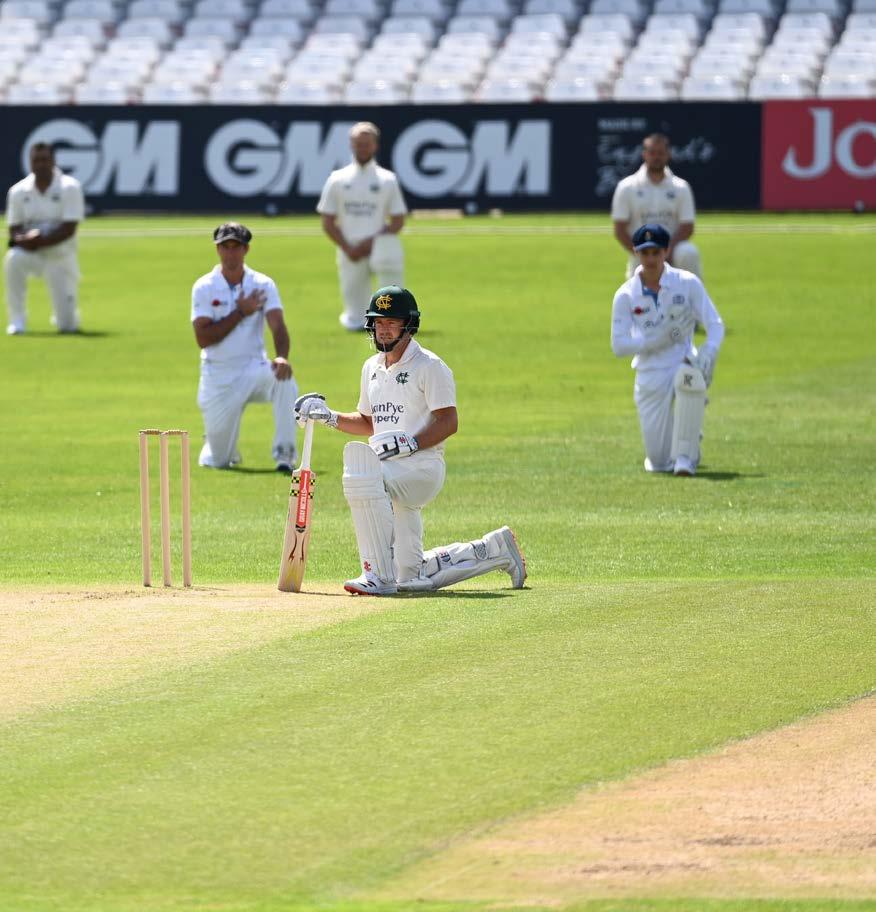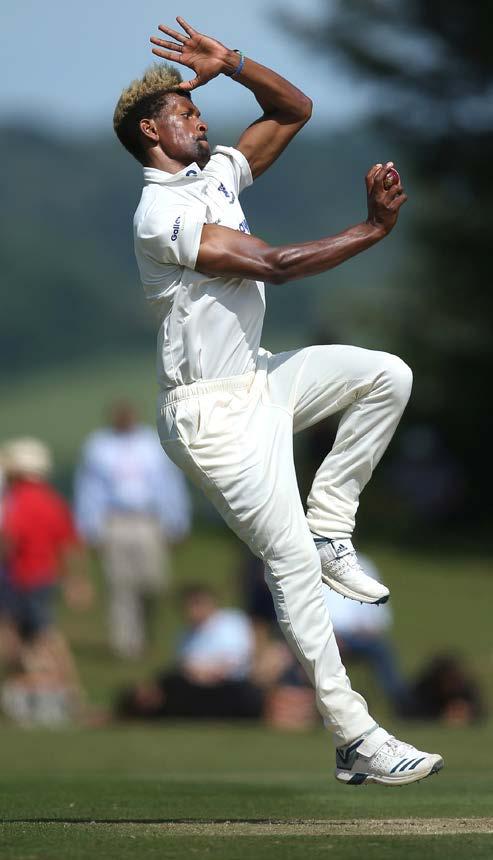
9 minute read
SPORT FOR ALL?
A GAME FIT FOR ALL
Peter Clark looks at the developing work of the PCA in its role of supporting players in the area of equality, diversity and inclusion.
In the wake of the tragic killing of George Floyd in Minneapolis on 25 May 2020, the issue of societal racism was once again brought into focus at a global level, but this time it felt different.
With large-scale demonstrations taking place in support of the Black
Lives Matter (BLM) movement in
London and other UK cities throughout May and June, sports people in England and Wales displayed their solidarity with Black communities by taking the knee ahead of fixtures. Professional cricketers were no different, with both the England men’s and women’s sides also sporting the
BLM emblem on the shirts during the summer.
Diversity has been key to the success of English cricket in recent times – World Cup-winning captain
Eoin Morgan reflected on having
“Allah with us” on the field at
Lord’s in July 2019 after his side’s historic victory. However, this does not tell the full story as the statistics show that Morgan’s
England are not representative of
English cricket in 2020.
The number of black players competing in English county cricket has fallen from 33 in 1995 to nine in 2019
1995 2019
Research carried out by Leeds Beckett University and published by Telegraph Sport in 2019 shows that over the last 25 years, the number of Black players competing in English county cricket has fallen by 75 per cent, from 33 in 1995 to just nine in 2019. In addition, out of the 118 support staff employed by the 18 first-class counties, only two are Black.
These numbers, as well as impassioned accounts of racism in English cricket from the likes of Michael Holding and Ebony RainfordBrent during the first Test of the summer against the West Indies, have led to players asking what more both the Association and the ECB can do to increase racial equality within the professional game.
A POSITIVE REACTION Derbyshire all-rounder and PCA Players’ Committee representative Anuj Dal says it has never been more vital to hold the cricketing authorities to account when it comes to an issue as important as racism in sport.
“Events in the USA were powerful. You can understand why the BLM movement is so strong and why people feel the way that they do.
“With the way racism is often disguised, there are grey areas around it not just in cricket, but also in sport more generally. I wanted to put myself in a position where I could help people understand and feel better educated around the issue of racism.
“Therefore, current and former players took it upon ourselves to ask the PCA for their stance on that matter, and undoubtedly the PCA was fully supportive of it.”
On the back of concerns raised by the likes of Dal, with former Sussex bowler Abidine Sakande also a leading voice, the PCA made a statement in support of the BLM movement in mid-June, before announcing its intention to effect change alongside the ECB on 7 July.
The PCA’s first port of call was to contact all current Black players for their thoughts and views on the issue, before expanding research to the current playing Black, Asian and minority ethnic (BAME) PCA membership.
Ongoing conversations then led to the formation of the PCA’s Equality, Diversity and Inclusion (EDI) Working Group, made up of key stakeholders covering the PCA, ECB, current and former players and the PFA, and chaired by PCA Chief Executive Rob Lynch.
The group first met on 17 July to discuss key issues such as awareness and acknowledgement of the issue of racism in the sport, as well as broadening the conversation to include academy and recreational cricket.
“When I was approached about joining the EDI group, it was a no-brainer for me,” says Dal.
Nottinghamshire opening batsmen Chris Nash and Haseeb Hameed take the knee in support of Black Lives Matter along with the Derbyshire team at Trent Bridge on August 1, 2020

“It’s been very, very positive so far. I’m pretty strong in my feelings of how the game can go about eradicating these type of situations, and the group has been moving forward since day one. I believe it’s capable of doing really good things.”


PCA Lead Personal Development Manager Charlie Mulraine has been a key figure in taking on board the concerns of PCA members, and has overseen the progress of the EDI Working Group from its formation to date.
“For me, it was just a case of listening. I
Mission Statement of PCA EDI Working Group
just wanted to understand what the PCA members who reached out to us were saying, why they were saying it and how they felt,” says Mulraine.
“We want to ensure that every single member feels that their voice is heard and that we’re accountable to our membership. We don’t want there to be any players in any dressing room who feel like they’re excluded.
“It’s also essential that the EDI Working Group adds value and adds understanding, so we ensured that we invited people with the relevant expertise into a virtual room together, whilst also gaining representation from the main stakeholders.
“This is something that is a key responsibility of the PCA, so it has to be long-lasting, not just a tick-box exercise.”
MEMBERS OF THE EDI WORKING GROUP
n ROB LYNCH (Chief Executive, PCA) n IAN THOMAS (Director of Development and Welfare, PCA) n ISA GUHA (Non-Executive Director, PCA) n CHARLIE MULRAINE (Lead Personal Development Manager, PCA) n KATHERINE BRUNT (Professional cricketer, England Women and Northern Diamonds) n MARK BUTCHER (Former professional cricketer) n ANUJ DAL (Professional cricketer, Derbyshire CCC) n ABIDINE SAKANDE (Former professional cricketer) n JAMES PYEMONT (Head of Integrity, ECB) n KATE ALDRIDGE (Strategy and Insights Manager, ECB) n SIMONE POUND (Head of Equality and Diversity, PFA)
WORKING WITH ECB Following initial research led by the PCA’s team of regional Personal Development Managers, one of the group’s key early decisions was to produce a survey, sent to all current male and female professional cricketers, academy players and former players from the last two years, made up of 20 questions surrounding their experiences of racism in the professional game.
The survey’s findings will enable the PCA to collaborate with the ECB to produce a Diversity and Inclusion strategy, and the rollout of an education programme in early 2021 will be one of the key steps taken to ensure that the PCA is not standing still on the issue of racism in cricket.
The PCA is also working closely with former Derbyshire and Sussex all-rounder James Pyemont, who is
now the ECB’s Head of Integrity. Pyemont sits on the EDI Working Group, and will help to draft a code of conduct which makes clear what is expected of players, as well as what the sanctions are for players who don’t follow the guidelines in terms of diversity and inclusion on and off the field.
The long-term aim of the group is to build on such work to cover all areas of equality, diversity and inclusion, including race, gender, sexuality and age. It will officially be an advisory group to the PCA Board, meaning there will be a constant and direct link between the findings of the EDI group and the decision-makers at the PCA.
LEARNING FROM OTHER CODES Collaborating with – and learning from – external bodies has been a key focus for the PCA throughout this process. Through relationships developed with the Professional Footballers’ Association (PFA) via the Professional Players’ Federation (PPF), the PCA has been able to utilise the expertise of individuals such as the PFA’s Head of Equality and Diversity, Simone Pound.
With 20 years of relevant experience giving her industry-leading knowledge of equality and diversity in sport, Pound’s expertise has been invaluable when progressing the PCA’s work in this area.
“I think what the PCA has done really well in this area is listen to its members and take on board their concerns. Getting that information back from members means that the PCA as an organisation is best placed to shape a programme that would be most fitting and appropriate for cricket.
“It’s really important that the PCA works as closely as possible with the ECB and the 18 first-class counties to align and work together on a strategic plan which it can then implement.
A leading voice: Abidine Sakande of Sussex bowls during the Sussex v Australia A tour match at Arundel Castle cricket club on July 8, 2019.

It’s really important that the PCA works as closely as possible with the ECB and the 18 first-class counties to align and work together on a strategic plan which it can then implement. Simone Pound, Head of Equality and Diversity, Professional Footballers’ Association
“Cricket as a sport is being very demonstrative that it is keen to address issues that are presenting across society, but especially in cricket which is currently not as diverse as it could - or perhaps should - be.”
Whilst Pound admits that the PFA has significant resources at its disposal, she also feels that there are many steps that other players’ associations like the PCA can take to replicate the work of the PFA in this area and ensure that all of its members feel more comfortable both on and off the playing field.
“The PFA has always had a really significant equalities strand running through it. We have a code of conduct and within the FA rules it’s all focussed on ensuring that discrimination isn’t tolerated within the game.
“The equalities department started with me and I’ve helped to grow it, but we’ve always been tackling the issue. It’s always been crucial for us as a union, but I’d still say we’ve got so much to do. If we’re leaders in that field, then it’s a long field because we still have a way to go in terms of BAME representation.”
Within professional cricket, the establishment of the EDI working group has been a crucial step in building a platform to tackle the issue of racial inequality head on. Starting with the rollout of education programmes in 2021, the PCA will continue to use the group’s findings to put mechanisms in place which aim to level the playing field in the long term.
The PCA is also committed to challenging the ECB on its processes in this area, including the introduction of a code of conduct, as well as ensuring the laws of the game are discrimination compliant.
Working together will be paramount when it comes to tackling an issue that has been generations in the making.







